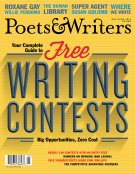In the January/February 2010 issue of Mother Jones, former Virginia Quarterly Review editor Ted Genoways notoriously complained about the state of American short fiction published in literary journals. We must be reading different magazines. Take Portland, Oregon–based Glimmer Train (www.glimmertrain.com), for example, whose new Spring/Summer issue has 336 pages of compelling fiction in settings ranging from a funeral-card company to Bagram Airfield in Afghanistan. Founded in 1990 by sisters Susan Burmeister-Brown and Linda B. Swanson-Davies and published three times each year, Glimmer Train has long been a reputable source for new fiction. “Every year we pay over fifty thousand dollars to fiction writers, and emerging writers are particularly welcome,” says Swanson-Davies. The work of four such emerging writers is included in the new issue, along with new work by Vi Khi Nao, Katherine Heiny, and D. S. Sulaitis. Story submissions are welcome year-round through the online submissions manager.
Former Paris Review editor Brigid Hughes launched A Public Space (www.apublicspace.org) in 2005 with a debut issue that included new stories from Charles D’Ambrosio and Kelly Link. In a 2006 interview with the Villager about founding APS, Hughes noted that many readers at the time considered fiction to be “irrelevant, that it wasn’t a way to understand the world...and I thought there was a need for a magazine to counter that argument.” APS has recently expanded into book publishing, collaborating with Graywolf Press to put out Karate Chop, a new collection of stories by Danish writer Dorthe Nors, published in February. The Winter 2014 issue includes an array of international fiction from Per Petterson, Helen Oyeyemi, and Kerstin Ekman. Committed to developing the careers of emerging writers, APS accepts submissions from September 15 to April 15 annually, by postal mail and online via Submittable.
After a year’s hiatus, Austin-based American Short Fiction (www.americanshortfiction.org), published three times yearly, returned last November with a new editorial team led by Rebecca Markovits and Adeena Reitberger. November’s “comeback issue” featured stories from Joyce Carol Oates and Kevin Wilson; the newly released Issue 57 includes some intriguing new work from Antonya Nelson and Karl Taro Greenfeld, and a story about nineteenth-century Virginia log drivers by Matthew Neill Null. The journal’s annual short fiction contest, judged this year by Amy Hempel, is currently open for submissions; entries are due June 1, and the winner will receive one thousand dollars and publication in ASF. General fiction submissions are considered year-round via Submittable.
Led for fifteen years by founding editor Diane Williams, each issue of NOON (www.noonannual.com) contains prose chiseled to its barest, most arresting essence—a concision attributed by most to Williams’s high demands as an editor. “She inspires excellence and demands discipline,” frequent NOON contributor Deb Olin Unferth says of Williams. “Clancy Martin and I now laugh about how she will take forty pages of writing and slash it down to two.” The new fifteenth-anniversary issue includes fiction from regular NOON contributors Lincoln Michel, Christine Schutt, and Anya Yurchyshyn, as well as newcomers Kayla Blatchley and Ashton Politanoff. NOON accepts submissions by postal mail year-round.
It’s nearly impossible to read short fiction today and not be well aware of One Story (www.one-story.com). Publishing single-story issues every three to four weeks, beginning in 2002 with “Villanova or: How I Became a Former Professional Literary Agent” by John Hodgman, the editors have continued to put out engaging stories from Laura van den Berg, Claire Vaye Watkins, Nam Le, and nearly two hundred more. One Story was the first literary magazine on the Kindle and remains a conspicuous digital presence, so it’s no wonder One Story is also the first such magazine to successfully branch out into the teen market, debuting One Teen Story (www.oneteenstory.com) in late 2012 “for young adult readers of every age.” One Teen Story’s May issue features the winner of last year’s story contest for teen writers; this year’s contest runs from May 1 to June 30 and is open to writers ages fourteen to nineteen. One Story considers submissions from September 1 to May 31 annually, and One Teen Story considers submissions year-round; both use an online submissions manager.
Travis Kurowski is the editor of Paper Dreams: Writers and Editors on the American Literary Magazine, published in 2013 by Atticus Books. His website is traviskurowski.com.








